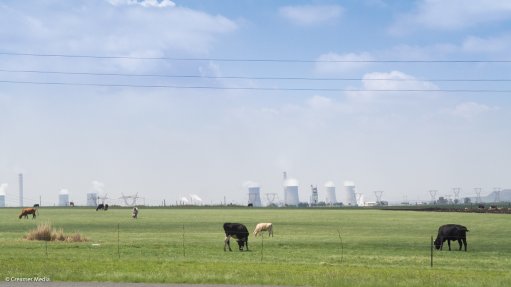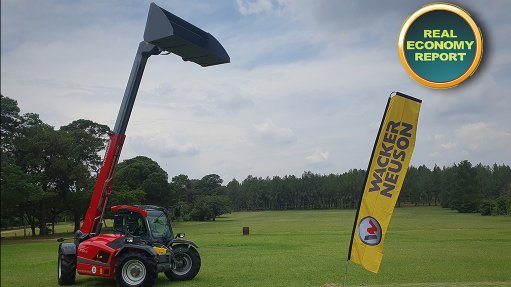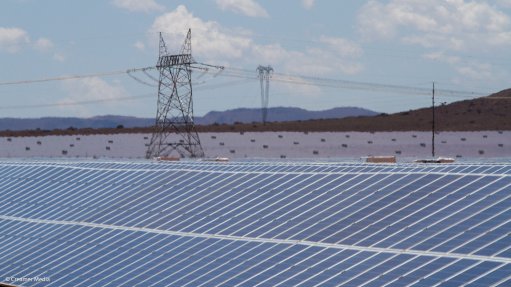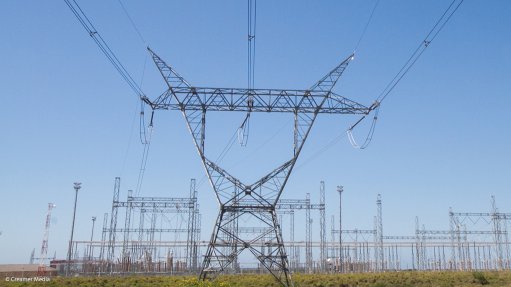Wits Mining Institute lays out challenges in local mining industry, way forward

In this video, Wits Mining Institute director Professor Glen Nwaila discusses the development of the CRM catalogue.
Overcoming the numerous challenges faced by the South African mining industry and ensuring its long-term sustainability and growth will require turning research curiosity into improved performance, relationship building and enabling technology, Wits Mining Institute (WMI) director Professor Glen Nwaila has said.
Speaking at the annual WMI Seminar, in Johannesburg, on September 28, he noted that the challenges facing the industry encompassed a range of issues, each with its own unique complexities and potential solutions.
One pressing issue is the proliferation of low-grade mines and the complex operating conditions they entail. High-grade ore deposits are dwindling, necessitating the extraction of lower-grade ores. These lower-grade ores are often more difficult and expensive to mine.
To address this challenge, the industry must embrace sustainable mining practices, leverage advanced ore processing technologies and invest in efficient mining equipment. These measures can enhance the economic viability of low-grade mines and ensure their continued operation.
Another challenge is the transition to deeper mines, which introduces heightened operational and safety concerns. As mines extend deeper into the Earth's crust, the risks associated with mining activities increase significantly.
To mitigate these risks, mining companies should allocate resources to research and develop advanced drilling and tunnelling technologies. Additionally, automation and stringent safety measures should be integrated into mining operations to safeguard the wellbeing of workers and enhance overall efficiency.
Climate change, coupled with energy costs and water scarcity, poses yet another challenge for the industry. The adverse impacts of climate change, rising energy expenses, and water shortages can disrupt mining operations and increase their vulnerability.
To address this, Nwaila said the industry should adopt renewable energy sources to reduce its carbon footprint and dependence on conventional energy. Implementing water recycling systems and sustainable mining practices can help conserve this precious resource, thereby enhancing resilience against water scarcity and related challenges.
He also highlighted critical raw material (CRM) mining, which he said presented unique operational difficulties owing to its smaller scale, high operational costs and limited technical and management skills.
Nwaila said collaborative efforts, such as research and development (R&D) initiatives and government support, were essential to improve the viability of CRM mining operations. Moreover, he said that investing in technical training and capacity-building programmes could empower the industry to better navigate these challenges.
He explained that recovery rates for CRMs were a crucial factor in ensuring the economic viability of mining operations. To improve these rates, he said that the industry should focus on continuous process improvement, employing advanced separation techniques, and using monitoring technologies to optimise recovery processes.
“We don't have all the CRMs in South Africa, meaning that the only way we can actually justify the transition in the country is to work with our fellow African countries. For this, we have a list of direct battery materials, and we also have a list of cross-cutting elements. This actually assists us to participate in terms of harnessing the knowledge and putting together a database that we call a catalogue that looks at CRMs,” Nwaila explained.
He added that there were three aspects pertaining to the integration of a CRM catalogue with the national CRM masterplan, with the first being the CRM catalogue development.
This comprises a comprehensive assessment of CRM needs, along with the regular updating of the CRM list. Nwaila explained that geological surveys would be a key contributing factor to this information, along with an analysis of supply chain integration. The catalogue would also include geopolitical and economic risk assessments, as well as an evaluation of global CRM trends and an analysis of supply and demand factors.
The identification of CRM substitutes would also play an important role in developing the policy framework for CRM security and the development of a CRM security strategy. Measures to reduce import dependency would also need to be assessed. Stockpiling and strategic reserve security would also require assessment, along with trade and export controls.
Several strategic manufacturing initiatives would also be part of the integration with the national CRM master plan. This would include investments in CRM processing facilities, R&D, CRM technologies, and support for CRM value chain development.
Nwaila emphasised the importance of encouraging circular economy practices.
He said that, in an era marked by constant disruptions, the need for resilient mining operations was evident. Digitalisation, the Internet of Things, and artificial intelligence (AI) would all play pivotal roles in achieving this resilience. By embracing these technologies, mining companies could optimise their operations, enable predictive maintenance, and establish reliable supply chains, Nwaila said.
Nwaila said two overarching solutions had been identified to address these challenges effectively.
Firstly, fostering a data-rich and informed society would be critical. This would involve making data-driven decisions, harnessing the power of AI and machine learning for data analysis, and automating repetitive tasks to enhance efficiency and decision-making within mining operations.
Secondly, Nwaila believed that an industrial evolution within the minerals sector was necessary. This evolution called for collaboration between skilled workers and AI-powered systems to boost productivity through human-machine collaboration, he said, adding that customisation and flexibility in mining processes would be essential to adapt to changing market conditions and ensure the industry's resilience and competitiveness.
Article Enquiry
Email Article
Save Article
Feedback
To advertise email advertising@creamermedia.co.za or click here
Comments
Press Office
Announcements
What's On
Subscribe to improve your user experience...
Option 1 (equivalent of R125 a month):
Receive a weekly copy of Creamer Media's Engineering News & Mining Weekly magazine
(print copy for those in South Africa and e-magazine for those outside of South Africa)
Receive daily email newsletters
Access to full search results
Access archive of magazine back copies
Access to Projects in Progress
Access to ONE Research Report of your choice in PDF format
Option 2 (equivalent of R375 a month):
All benefits from Option 1
PLUS
Access to Creamer Media's Research Channel Africa for ALL Research Reports, in PDF format, on various industrial and mining sectors
including Electricity; Water; Energy Transition; Hydrogen; Roads, Rail and Ports; Coal; Gold; Platinum; Battery Metals; etc.
Already a subscriber?
Forgotten your password?
Receive weekly copy of Creamer Media's Engineering News & Mining Weekly magazine (print copy for those in South Africa and e-magazine for those outside of South Africa)
➕
Recieve daily email newsletters
➕
Access to full search results
➕
Access archive of magazine back copies
➕
Access to Projects in Progress
➕
Access to ONE Research Report of your choice in PDF format
RESEARCH CHANNEL AFRICA
R4500 (equivalent of R375 a month)
SUBSCRIBEAll benefits from Option 1
➕
Access to Creamer Media's Research Channel Africa for ALL Research Reports on various industrial and mining sectors, in PDF format, including on:
Electricity
➕
Water
➕
Energy Transition
➕
Hydrogen
➕
Roads, Rail and Ports
➕
Coal
➕
Gold
➕
Platinum
➕
Battery Metals
➕
etc.
Receive all benefits from Option 1 or Option 2 delivered to numerous people at your company
➕
Multiple User names and Passwords for simultaneous log-ins
➕
Intranet integration access to all in your organisation


















